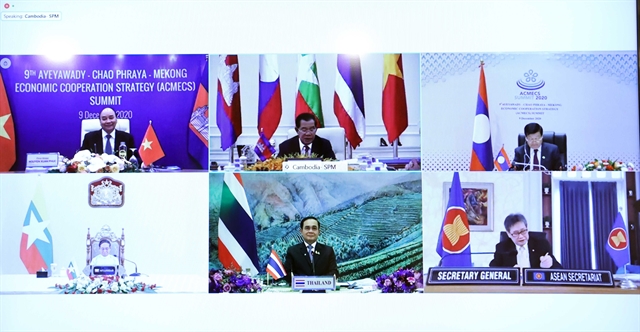 Politics & Law
Politics & Law

The ninth Ayeyawady-Chao Phraya-Mekong Economic Co-operation Strategy (ACMECS) Summit held via videoconference on Wednesday has adopted a Phnom Penh declaration.

|
| Leaders from Cambodia, Laos, Myanmar, Thailand, and Việt Nam attend the ACMECS Summit on Wednesday. — VNA/VNS Photo |
HÀ NỘI — The ninth Ayeyawady-Chao Phraya-Mekong Economic Co-operation Strategy (ACMECS) Summit held via videoconference on Wednesday has adopted a Phnom Penh declaration.
Leaders from Cambodia, Laos, Myanmar, Thailand, and Việt Nam passed the declaration, which focuses on post-pandemic socio-economic recovery and preparations for future crises and challenges through public health cooperation and supply chains. It also emphasises that public private partnerships should be a locomotive for economic development.
The spokesman for the Thai Government, Anucha Burapachaisri, said the summit looked into ACMECS co-operation within three pillars: a seamless ACMECS to promote regional connectivity, a synchronised ACMECS to promote harmonisation of trade, investment and industry policies, and a smart and sustainable ACMECS.
Member states agreed with a Thai proposal to add “a safe, secure, and trustworthy ACMECS” as a fourth pillar.
Vietnamese Prime Minister Nguyễn Xuân Phúc said over the past 17 years, ACMECS co-operation has affirmed its own identity and become an important co-operation mechanism of the Mekong sub-region.
“The 2019-23 ACMECS master plan is being deployed on three pillars based on comprehensive connectivity, towards building a competitive, dynamic and sustainable economy. Progress in establishing ACMECS development fund as an innovative finance mobilisation mechanism will support the implementation of co-operation programmes,” Phúc said.
PM Phúc proposed the five Mekong countries foster economic and transport connection along the East-West Economic Corridor and accelerate the connection between the corridor and major industrial and economic centres while developing transport infrastructure systems in the border area, encourage air, road and railway connections between cities, cultural heritages and natural wonders of the region. The countries must also do research and sign coastal transport agreements.
He highlighted the Mekong countries need to pay attention to sustainable agricultural development, towards the formation of Mekong agricultural value chains and deeper integration into the global value chain. This is a potential sector that accounts for a large proportion of the labour force in the Mekong countries.
Countries in the region need to promote co-operation in environmental protection, sustainable management of natural resources, response to climate change and natural disasters, and promote the role of the ACMECS co-operation.
“I believe that with the determination and efforts of the member countries, the co-operation of our five countries will grow stronger and stronger for the sake of peace, stability and common prosperity of our region. We welcome and support the ACMECS Secretariat and hope to co-operate with partners for regional common development,” he said.
In his speech, Thai Deputy Prime Minister and Minister of Defence Prayut Chan-o-cha recommended that ACMECS co-operation be based on multidimensional connectivity, the establishment of an ACMECS development fund, and the establishment of an ACMECS Secretariat.
He said multidimensional connectivity was key to the development of ACMECS, and stressed the importance of promoting the application of technology in cross-border trade and developing digital platforms for micro, small and medium-sized enterprises (MSMEs) to boost business capacity while generating more jobs that help improve livelihoods and reduce development gaps.
The next step in developing the ACMECS master plan is to enhance co-operation in the field of public health, he added.
As for the ACMECS fund, he said it helps development projects reflect the demands of the subregion. He also affirmed Thailand’s commitment to contributing US$200 million to support projects that bring benefit to local people and the subregion.
He expressed a belief that the summit will show off to the world an ACMECS with the solidarity to counter any challenges and ensure the sustainable development of the subregion.
The same day, Vietnamese PM Nguyễn Xuân Phúc attended and delivered speeches at the 10th Cambodia-Laos-Myanmar-Việt Nam (CLMV) Summit and the 11th Cambodia-Laos-Việt Nam Summit on Development Triangle Area (CLV-11).
Under the chair of Lao Prime Minister Thongloun Sisoulith, the 10th CLMV Summit held via videoconference reviewed the results of the implementation of the 9th CLMV Summit’s joint statement and the CLMV Plan of Action for 2019-20, especially the implementation of commitments to intensify regional links, improve infrastructure, develop the East-West Economic Corridor, the South Economic Corridor, and the ASEAN Highway, and build competent human resources to post effective economic integration.
With the theme “Enhancing connectivity efficiency for regional integration”, participating leaders approved a joint statement of the 10th CLMV Summit and a Priority Programme, along with a CLMV Development Programme. — VNS




